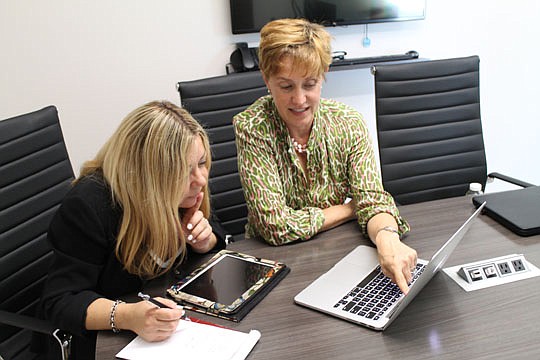
By Carole Hawkins, [email protected]
Not enough people like Lisa Barton.
Broker of a real estate agency in Ponte Vedra Beach, Barton’s built a successful luxury home business up to this point by doing things a little differently.
Now, she’ll conquer social media.
“I want to catch it before it really gets big,” she said. “Especially for people who are 40 years old and below, it’s become more of a place they’re going to go.”
She pointed to the number of “likes” on her Facebook page — 211. She wants to boost it to at least 500, a tipping point that indicates market traction.
Barton reached 211 by posting home listings and office updates, with the occasional holiday greeting or link to a newspaper article.
Ten posts on a good month, two on a bad one.
“Realtors are busy people,” said Michele Vescovacci , a social media and marketing consultant. “Lisa was doing it all herself and it was not consistent enough to get results.”
In May, Barton hired Vecovacchi to manage a six-month social media campaign for her.
Vescovacci prescribed more posts. Three to five a week is ideal, she said.
There should be better optimization of content. They would use the words “Ponte Vedra” in order to be picked up by people zeroing in on Barton’s location and “million dollars” to target customers seeking luxury homes.
The content would also become more varied, with information about schools, restaurants and events.
“People want to learn about the communities where they are going to buy, not just see postings of properties,” Vescovacci said.
Barton had been posting only to Facebook, ignoring other social media. She used LinkedIn so infrequently, she’d forgotten her password.
Vecsovacci expanded her reach to Twitter, Instagram, Google Plus and LinkedIn.
The latter isn’t just a place to find a job, Vescovacci explained. It’s a place to build professional relationships. Members do that by joining groups. In Barton’s case, groups of doctors, lawyers and other people who buy million-dollar homes.
“You have to be careful what you post, though,” Vescovacci said. “You can’t hard sell.”
The cornerstone of an online presence is a company website. But social media is what gets people talking about a company.
Barton knows. She’s earned three glowing reviews on Facebook. After one of them, she got a call from a reader who wanted to sell her own home. Barton had unleashed the power of referrals, one the social media’s biggest advantages.
Eighty percent of Facebook users will try something based on a suggestion made through social media, said Dan Broze, branch manager for Web.com.
Known for designing websites for small businesses, Web.com also manages online marketing campaigns, including social media campaigns.
People often use Facebook to affirm a decision, Broze said.
“If I want to go to a restaurant that I’ve never been to before, I’ll go to Facebook and see what people are saying,” he said.
People may also “find” a business on Facebook — through the search box at the top of the page, through targeted ads on the side bar and within news feeds, or through “likes.”
“Page likes are extremely important, because the moment I like a company page, people that I’m connected to will see a post that says, ‘Dan likes this,’” Broze said. “A thousand people who follow me will see it.”
Facebook rewards businesses that consistently post content relevant to their industry.
It targets readers based on their behaviors — what sites they visit and information from their personal page — rather than just on their search text.
A business page can get messages to Facebook readers “organically,” just by posting.
Or it can reach them through advertising — “boosting” a post or buying pay-per-click ads.
The problem with the organic approach is Facebook today is giving away a lot less for free.
Craig Grant teaches social media classes through the Northeast Florida Association of Realtors.
It used to be everyone who liked a page saw its posts, Grant said, as long as they logged in within a reasonable amount of time. Now, it’s only people who are logged in at the time of the post and who have shown an interest in the subject that see the post.
Forbes in a May 14 article reported that Facebook posts today organically reach only about 7 percent of a page’s followers.
“They’ve really made it a more pay-to-play system,” Grant said. “Especially for someone who is just starting out in social media it’s become a tough row to hoe, unless you’re going to spend some money.”
Still, both a website and social media are necessary to business, Grant said. A website, for advertising. Social media, for building customers relationships.
With 1.2 billion people on Facebook, it’s become too big a resource for the marketing industry to ignore.